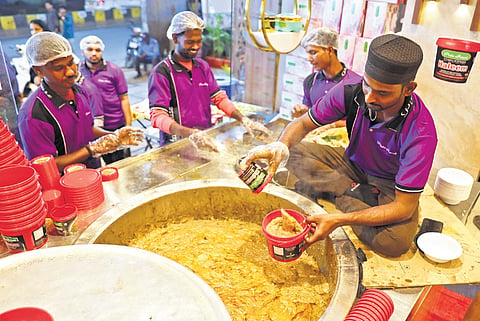

HYDERABAD: The cost of ingredients used in making mutton haleem, including mutton itself, has increased significantly. However, despite this surge in expenses, the price of the dish has not been increased in most of the restaurants, putting financial strain on their businesses.
Haleem, a popular dish consumed during the holy month of Ramzan, requires key ingredients like mutton, wheat, lentils, ghee and spices—all of which have seen steep price hikes.
Rizwan, the owner of Y2K restaurant told TNIE: “Ingredient prices have nearly doubled. In 2024, the cardamom rate was Rs 2,400 per kg, but it has now surged to Rs 4,500. Similarly mutton prices have increased from Rs 700 per kg in 2024 to Rs 1,000 this year.”
Despite these challenges, Rizwan continues to sell haleem at Rs 160 per plate, without any price increase. “We are merely recovering our investment, with no profit. Yet, raising prices is not an option, as it may drive away customers. This is our livelihood, so we must continue”, Rizwan added.
Social activist Mohammed Abid Ali highlighted the impact of inflation, stating that stagnant wages and rising costs have made even basic food items unaffordable for many. The rising costs of essential haleem ingredients have forced families to either reduce their portions or stop consuming the dish altogether. While upscale restaurants continue serving lavish iftar platters, daily wage earners struggle to afford a meal. The widening gap between the wealthy and the struggling exposes the harsh realities of economic disparity,” he said.
Abdul Kaleem, owner of Elite Kitchen in Madina, attributed the rising mutton prices to the ongoing bird flu outbreak, which has reduced chicken consumption and driven up the demand for mutton. “With more people avoiding chicken, the demand for mutton has increased, pushing up its price. This has also affected the cost of other ingredients,” he explained.
While chicken haleem’s demand has declined, mutton haleem remains popular. However, vendors remain hesitant to raise prices. “If we increase the rates now, we might lose customers. Since Ramzan has just begun, we are monitoring the situation. We may consider a price increase before the month ends,” Kaleem added.